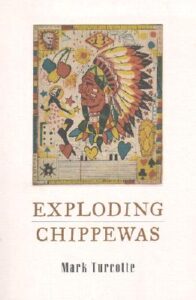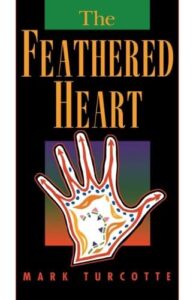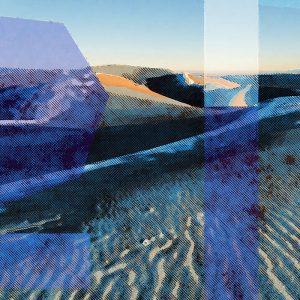Mark Turcotte
Dear New Blood
A poet reads to a room full of youths who seem to have some residual resentment to the poet. The poet doesn’t mind — he understands, and calls on the listeners to share in the power of focused anger, to make it a motivation for their creativity.
We’re pleased to offer Mark Turcotte’s poem, and invite you to connect with Poetry Unbound throughout this season.
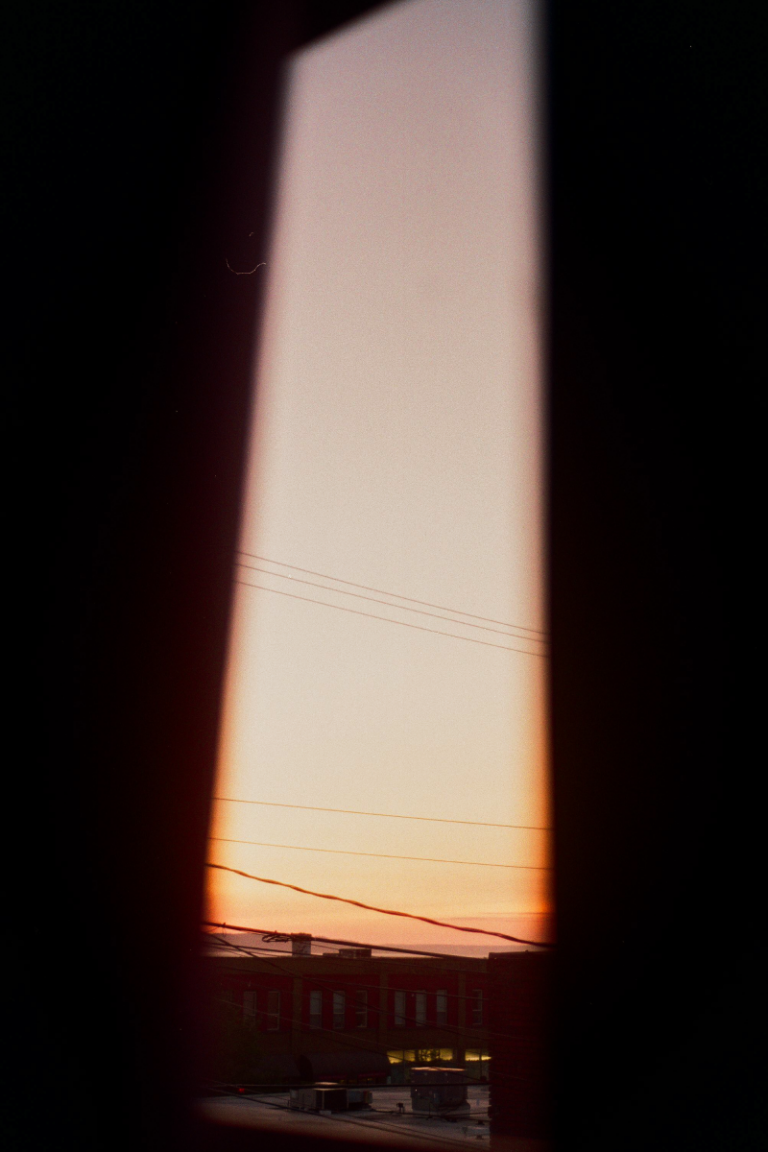
Image by Annisa Hale/ Film processed by Moody's Film Lab, © All Rights Reserved.
Guest
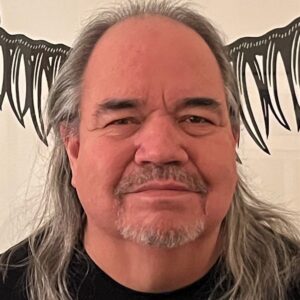
Mark Turcotte (Turtle Mountain Ojibwe) is the author of The Feathered Heart (Michigan State University Press, 1998) and Exploding Chippewas (Triquarterly Books, 2002). He lives in Chicago, where he teaches at DePaul University.
Transcript
Transcription by Alletta Cooper
[music: “Praise the Rain” by Gautam Srikishan]
Pádraig Ó Tuama: My name is Pádraig Ó Tuama, and in different parts of the world, at different stages, there’ll be arguments about poetry on the page and poetry on the stage; the idea of performance poetry and written poetry, and some people saying what poetry should be and what it shouldn’t be. I find myself often bored by the imagination of binary in that. Because poetry has been around since before people were writing and poetry was memorized and recited and heard and experienced first before there was this binary between page and stage. Poetry loses by imagining itself as a singular form. And within the context of that, sometimes we can be brought into a conversation that’s actually self-defeating. And what we’re really being called to is to turn to what is foundational for us, and what is foundational in poetry is the experience of being moved to try to say something in the face of the unsayable.
“Dear New Blood” by Mark Turcotte
“Dear New Blood
“You don’t need me, I know, here on this podium with my poem. You hunched
in the back of the room, tilted in your lean reservation lean. You ho-hum your
gaze out the window toward some other sky.
“Dear new blood, dear holy dear fully mixed up mixed down mixed in and out
blood, go ahead and kick the shit, kiss the shit from my ears. I swear I swear
I’ll listen. Stutter at stutter at me you uptown weed you thorn you petal, aim
my old flowered face at the sky.
“I know you don’t need me, here on this podium with my poem. You pressed
flat to the wall, shoulders cocked, loaded for makwa, for old growlers like me.
You yawn your glance out the window at the tempting sky.
“Wake me. Bang my dead drum drum, clang clang my anvil my bell. Shout me
hush me your song, your shiny impossible, your long wounded song. Tell me
everything you know, you don’t. Tell me, do you feel conquered and
occupied? Maybe I’ve forgotten. Sing it plain, has America ever been America
to you, let you be you in your own sky?
“Sing deep Chaco, deep Minneapolis, deep Standing Rock, deep Oakland and
LA. Sing deep Red Cliff, sing Chicago, deep Acoma, deep Pine Ridge and
Tahlequah. Sing and mourn. I think you, too, were born with broken heart.
Rise. Smash your un-American throat against the edge of the reddening sky.”
[music: “Every Place We’ve Been” by Gautam Srikishan]
“Dear New Blood” by Mark Turcotte is a poem addressed to Indigenous poets, and the poem is in the form of a letter with “Dear New Blood” as the title, as well as the way that the recipients of the poem are addressed. And “Dear new blood” is repeated in the second paragraph, and it’s kind of elongated: “dear holy dear fully mixed up mixed down mixed in and out / blood.” So there’s this real embrace by saying this is who it’s for, this is to you.
Mark Turcotte is Turtle Mountain Anishinaabe, and by speaking in this way, what he’s doing is addressing himself to a very particular community of people. He had been resident at the Institute of American Indian Arts in 2008 and 2009. He wrote an author’s note for this poem. An earlier version of the poem was up on poets.org. And he was speaking about being “startled by the deep whirling force of raw poetry of so many young native voices” and being humbled and encouraged how open they were to him. And in a certain sense, imagining and being aware and remembering the times that he’d seen young natives hunched in the back of some room on a campus somewhere at one of his readings. And he said that he could see that they were “bored but vibrating.” And he said he felt for them because he “knew what it was like to be twenty and buzzing in the blood to sing out.” So “Dear New Blood” is addressed to them, and also it’s addressed to the “him” that was “them.”
[music: “Campfire Rounds” by Blue Dot Sessions]
One of the things that a poem is, is it is a sonic event as well as a literary event. It is to be heard as well as to be read. And this poem builds on this sonic experience, the sound experience of it. So sometimes it isn’t only the meaning of the words, but it’s the sound and the feeling of the words in a poem that is meant to draw you in.
And he makes great use of modifying this. “Go ahead and kick the shit, kiss the shit from my ears.” Kick and sh-, this strong, sharp sounds as well as these sibilants. Extraordinary, the way that there’s the variety of the power of sound here. And then as the poem continues, “Wake me. Bang my dead drum drum, clang clang my anvil my bell. Shout me / hush me your song, your shiny impossible, your long wounded song.” These words coming after each other are giving a certain sense of audible heightened volume to the experience of the emotion that is seeking to be brought out into public. And he’s saying, Amplify the sound that’s in you. That can be the sound of your own cacophony. That can be cathartic, that can open things up so that you hear the very thing you need to feel.
“Tell me / everything you know, you don’t.” This extraordinary line that holds the recognition of what you do and what you don’t know, what you do and what you don’t feel, is giving an emotional experience to the release that sound can be in and of itself. “Sing deep Chaco, deep Minneapolis.” Calling places to mind to say: these places have old laments to be sung and in that old lament — “Sing and mourn” — he is saying that there is power, there is community, and there is re-creation possible by letting the sound of lament, the sound of place, the sound of your own voice, be in chorus with each other.
[music: “Levander Crest” by Blue Dot Sessions]
There’s an imagination in the poem that the new blood are out on the hunt, “pressed / flat to the wall, shoulders cocked, loaded for makwa,” — which is Ojibwemowin for bear — “for old growlers like me.” So he’s saying, in a certain sense: I’m your prey and it’s okay. I understand you want to shoot me down. And he’s addressing that desire and saying he’s not frightened of it. Neither should anybody else be. But let’s use it for something that is about connecting with each other. He’s not frightened at the heightened sense of feeling in the room, and he is able to say, “This is totally true.” And by naming it and by not responding, or amplifying it into a small corner of disagreement he turns that into art.
I think there is a deep intelligence about language, a deep intelligence about the artistic community, and a deep intelligence about not being commodified into totally distracting arguments that can happen in artistic communities. He’s saying: Take it. Yes. Take that burning ambition. Take that desire, take that deep knowledge that you have of injustice, and turn that towards something of creativity. Turn that towards something that will deepen our connection with each other. That will teach me what I don’t know. “Old growlers like me.”
[music: “Tessalit” by Blue Dot Sessions]
This poem, after addressing its addressees, “Dear New Blood,” is in five prose poetry paragraphs. And each paragraph finishes with the word sky: “Towards some other sky.” “Flowered face at the sky.” “Window at the tempting sky.” “Let you be you in your own sky.” And then, “un-American throat against the edge of the reddening sky.” By finishing each stanza with the word “sky,” our attention is being drawn to sky. And sky is modifying the whole way throughout it. That the sky can redden, the sky tempts, the sky that should be yours but isn’t. And one of the uses of “sky” in this poem is to say that somebody perhaps has taken the sky. Somebody has not let you be you in your own sky, has colonized it, taken it away from you.
In contrast with that, he places land — these very particular places, Chaco, Minneapolis, Standing Rock, Oakland and LA, Red Cliff, Chicago, Acoma, Pine Ridge, Tahlequah — these places, some of which are Indigenous names that have been brought into everyday usage, some of which aren’t, and he is highlighting those to say: maybe land is the very thing that will hold you in the presence of your art, in the presence of your community. And by being rooted in land, no matter what the sky is showing or who’s changing the sky or taking the sky, that you can be located in this place.
There’s again, in that last powerful line, there’s a deep question of what’s it like to belong to a place where you’re told you don’t belong, or you feel in policy and experience that you don’t belong? “Smash your un-American throat against the edge of the reddening sky.” And the verb and the imperative — “smash” — there is letting rage be the register of art and letting rage be the invitation into creativity.
[music: “Thread Caramb” by Blue Dot Sessions]
While this poem is so particularly addressed to the imagination of new blood in the room, this poem is also stretching across time. “Sing it plain, has America ever been America / to you?” That’s an echo there of Langston Hughes. “Let America Be America Again,” or certainly that’s how I hear it.
And even before that, “tell me, do you feel conquered and / occupied?” This is saying that the history of the past is present here. The past is only the past for those who have the luxury of being able to say it’s the past. Whereas for many people, of course, all across the world, they live with the past as it’s being repeated in policies and consequences. And so, “do you feel conquered and occupied?” The feeling of that. “Maybe I’ve forgotten. Sing it plain.” And there’s an invitation to mourn, an invitation to lament, an invitation to be present with everything that feels and is unjust and saying: Let that be a song. Let that be a poem.
[music: “Thread Caramb” by Blue Dot Sessions]
“Dear New Blood” by Mark Turcotte
“Dear New Blood
“You don’t need me, I know, here on this podium with my poem. You hunched
in the back of the room, tilted in your lean reservation lean. You ho-hum your
gaze out the window toward some other sky.
“Dear new blood, dear holy dear fully mixed up mixed down mixed in and out
blood, go ahead and kick the shit, kiss the shit from my ears. I swear I swear
I’ll listen. Stutter at stutter at me you uptown weed you thorn you petal, aim
my old flowered face at the sky.
“I know you don’t need me, here on this podium with my poem. You pressed
flat to the wall, shoulders cocked, loaded for makwa, for old growlers like me.
You yawn your glance out the window at the tempting sky.
“Wake me. Bang my dead drum drum, clang clang my anvil my bell. Shout me
hush me your song, your shiny impossible, your long wounded song. Tell me
everything you know, you don’t. Tell me, do you feel conquered and
occupied? Maybe I’ve forgotten. Sing it plain, has America ever been America
to you, let you be you in your own sky?
“Sing deep Chaco, deep Minneapolis, deep Standing Rock, deep Oakland and
LA. Sing deep Red Cliff, sing Chicago, deep Acoma, deep Pine Ridge and
Tahlequah. Sing and mourn. I think you, too, were born with broken heart.
Rise. Smash your un-American throat against the edge of the reddening sky.”
[music: “Praise the Rain” by Gautam Srikishan]
Chris Heagle: “Dear New Blood” was originally published in Poem A Day by the Academy of American Poets. Thank you to Mark Turcotte who gave us permission to use his poem. Read it on our website at onbeing.org.
[music: “Praise the Rain” by Gautam Srikishan]
Poetry Unbound is: Gautam Srikishan, Eddie Gonzalez, Lilian Vo, Lucas Johnson, Amy Chatelaine, Kayla Edwards, Annisa Hale, and me, Chris Heagle.
Our music is composed and provided by Gautam Srikishan and Blue Dot Sessions.
This podcast is produced by On Being Studios, which is located on Dakota land. Open your world to poetry with us by subscribing to our Substack newsletter. You may also enjoy Pádraig’s new book, Poetry Unbound: 50 Poems to Open Your World. For links and to find out more visit poetryunbound.org.
Books & Music
Recommended Reading
The On Being Project is an affiliate partner of Bookshop.org and Amazon.com. Any earnings we receive through these affiliate partnerships go into directly supporting The On Being Project.





